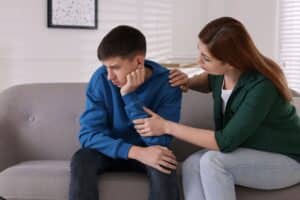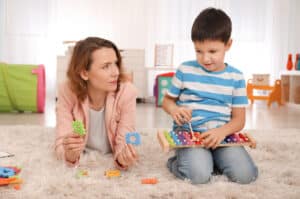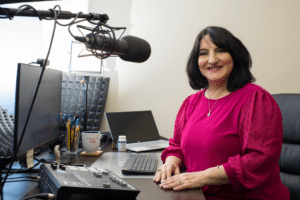Parenting, especially when dealing with children facing behavioral or mental health challenges, can be an overwhelming journey. To help parents, each podcast shares practical strategies that create change.
I also know that parenting can be overwhelming and that means sometimes not only can our children and teens trigger us and cause quite a bit of distress. That is why I created a calm parenting podcast series, so parents can get the support they need.
This calm parenting podcast series is rich with practical advice and is a treasure trove of insights derived from my 30 of helping thousands of kids and their family when they face some of the greatest behavioral and mental health struggles – anxiety, OCD, depression, PANS/PANDAS, ADHD, ASD, etc. Listen in and learn how you can effectively navigate the complexities of raising children with mental health issues.
How to Be a Calmer Parent
Being a calm parent is essential for fostering a positive and nurturing environment for your children. When we self-regulate our nervous system, we have more patience and we can be more present… and that means we feel better about ourselves and our parenting.
Practical tips on achieving calm as parents:
1. Practice Self-Regulation
Self-regulation is fundamental in controlling emotions, thoughts, and behaviors. Our emotions are influenced by external stimuli and experiences, impacting us in many ways. Coping skills and a balanced nervous system are crucial for managing stress and dysregulation, particularly in children.
Signs like tantrums, impulsivity, and attention issues are often misinterpreted as ADHD symptoms. Individualized approaches, including brain mapping and journaling, help uncover root causes, paving the way for targeted interventions and understanding the complexities of dysregulation. Listen to Episode 151: What is Self Regulation? to learn more.
2. Understand the triggers
Emotional dysregulation is often triggered by factors like overstimulation or clinical conditions such as ADHD or anxiety, and it can disrupt daily life and hinder well-being. Understanding these triggers and tuning into bodily sensations allows kids to learn how to regulate their nervous systems and find calm amidst the chaos.
Recognizing the signs of discomfort and implementing strategies like breathwork and sensory tools can help children and adults manage their emotions and thrive in their daily lives. Listen to Episode 164: Behavioral Regulation and Mood Therapy, where I shared valuable resources and practical tools for parents.
3. Address sensory challenges
Conditions like autism, ADHD, and learning disabilities highlight the interconnectedness of self-regulation challenges with cognitive, emotional, and social functioning. Sensory issues intensify stress on the nervous system, leading to overstimulation from the environment and heightened emotional responses. Calming the nervous system and addressing sensory challenges greatly help.
Listen to Episode 153: Self Regulation and The Neurodivergent Brain and learn how to recognize the strengths and challenges of the neurodivergent brain, which is crucial for navigating complexities and unlocking transformative approaches.
4. Promote social interaction
Integrating pro-social activities and involving parents in these initiatives reinforces positive behaviors and effectively supports children's emotional and behavioral needs. Practicing self-regulation in the classroom environment allows for early identification and intervention for children facing emotional and behavioral dysregulation.
Recognizing issues like impulsivity and difficulty in transitioning is essential for creating a stable foundation for learning, especially during crucial developmental stages. Teachers play a vital role in modeling desired behaviors and incorporating goal-setting and planning into the curriculum to address executive functioning skills.
Moreover, teaching emotional regulation and organizational skills within the school setting enhances holistic development and fosters well-being, particularly in the face of heightened stressors like the current pandemic. Listen to Episode 155: Self-Regulation in the Classroom to learn more about this.
5. Learn more about dysregulation
Dysregulation profoundly affects your children's lives, whether emotional, biological, cognitive, social, or pro-social. Each aspect of self-regulation influences our well-being and relationships. Fostering self-regulation in these five key areas enhances personal growth and strengthens connections within our communities, paving the way for a healthier and more balanced society. I discussed this more in Episode 152: What are the Five Areas of Self-Regulation?
Calm Parenting Podcasts Bonus:
PEMF, or pulsed electromagnetic field therapy, is pivotal in my clinical practice. It offers solutions for anxiety, depression, PANS/PANDAS, OCD, ADHD, and more. PEMF can be integrated into natural therapies to harmonize cellular communication for improved brain and body functioning.
Cellular communication promotes a shift to a calmer state, and PEMF therapy aids in that. It helps counter daily stressors and relieves mood swings and brain fog. Our Calm PEMF is convenient and portable, providing comprehensive support and adaptable to individual needs. Listen to this episode to learn how it can offer a promising pathway to better overall well-being and vitality.
These Calm Parenting Podcast suggestions have helped you incorporate diverse perspectives in fostering and supporting your child struggling with mental health problems. These podcasts can serve as lifelines for parents who seek alternative solutions to cognitive and behavioral health issues. Subscribe to the Dr. Roseann podcast now.
Dr. Roseann is a mental health expert in Parenting who is frequently in the media:
- Business Insider How to practice ‘autonomy-supported parenting' to boost your family's wellbeing
- Healthline Get Stuff Done: A Realistic Guide to Working From Home with Kids
- Love Shack Live How To Navigate The Parenting Journey As A Couple
Always remember… “Calm Brain, Happy Family™”
Disclaimer: This article is not intended to give health advice and it is recommended to consult with a physician before beginning any new wellness regime. *The effectiveness of diagnosis and treatment vary by patient and condition. Dr. Roseann Capanna-Hodge, LLC does not guarantee certain results.
Are you looking for SOLUTIONS for your struggling child or teen?
Dr. Roseann and her team are all about science-backed solutions, so you are in the right place!
Unlock Your Child’s Behavior, Attention and Learning With Science-Backed Solutions
Dr. Roseann is a Children’s Mental Health Expert and Licensed Therapist who has been featured in/on hundreds of media outlets including The Mel Robbins Show, CBS, NBC, PIX11 NYC, Today, FORBES, CNN, The New York Times, The Washington Post, Business Insider, Women’s Day, Healthline, CNET, Parade Magazine and PARENTS. FORBES called her, “A thought leader in children’s mental health.”

She coined the terms, “Re-entry panic syndrome” and “eco-anxiety” and is a frequent contributor to media on mental health.
Dr. Roseann Capanna-Hodge has three decades of experience in working with children, teens and their families with attention-deficit hyperactivity disorder (ADHD), autism, concussion, dyslexia and learning disability, anxiety, Obsessive Compulsive Disorder (OCD), depression and mood disorder, Lyme Disease, and PANS/PANDAS using science-backed natural mental health solutions such as supplements, magnesium, nutrition, QEEG Brain maps, neurofeedback, PEMF, psychotherapy and other non-medication approaches.
She is the author of three bestselling books, It’s Gonna Be OK!: Proven Ways to Improve Your Child's Mental Health, The Teletherapy Toolkit, and Brain Under Attack. Dr. Roseann is known for offering a message of hope through science-endorsed methods that promote a calm brain.
Her trademarked BrainBehaviorResetⓇ Program and It’s Gonna be OK!Ⓡ Podcast has been a cornerstone for thousands of parents facing mental health, behavioral or neurodevelopmental challenges.
She is the founder and director of The Global Institute of Children’s Mental Health, Neurotastic™Brain Formulas and Dr. Roseann Capanna-Hodge, LLC. Dr. Roseann is a Board Certified Neurofeedback (BCN) Practitioner, a Board Member of the Northeast Region Biofeedback Society (NRBS), Certified Integrative Mental Health Professional (CIMHP) and an Amen Clinic Certified Brain Health Coach. She is also a member of The International Lyme Disease and Associated Disease Society (ILADS), The American Psychological Association (APA), Anxiety and Depression Association of America (ADAA) National Association of School Psychologists (NASP), International OCD Foundation (IOCDF).
© Roseann-Capanna-Hodge, LLC 2024











